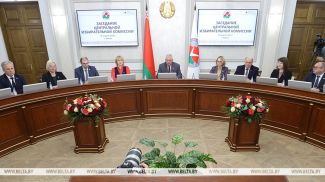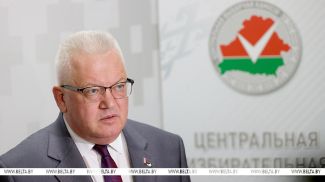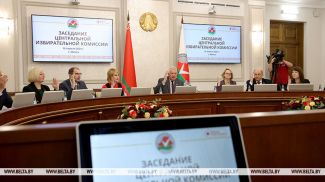MINSK, 22 November (BelTA) – Every year medicines are getting increasingly affordable for Belarusians due to improvements in the national pharmaceutical industry and the procurement system, as well as thanks to bigger government funding of purchases of medicines, Belarus' Deputy Premier Igor Petrishenko said at the second Eastern Europe and Central Asia Regional Consultation on Expanding Access to Affordable and Quality Assured Antiretroviral and Antituberculosis Medicines on 22 November, BelTA has learned.
“Belarus is hosting this important event again, which makes us very happy. Over the recent decades budget spending on fighting HIV/AIDS, hepatitis C and tuberculosis has risen more than threefold. In 2018, some 86% of antiretroviral drugs were purchased using the funds of the central budget. We fully acknowledge the important role of greater access to quality-assured medicines, therefore we attach much attention to promoting the national pharmaceutical industry,” Igor Petrishenko said.
To illustrate his point, Igor Petrishenko provided the following statistics: four domestic pharmaceutical companies produce medicines to treat hepatitis C; the country makes 13 out of 15 names of antiretroviral drugs it uses, as well as 10 out of 11 medicines to treat tuberculosis. “Simultaneously, we are streamlining the procurement system. Thus, we allow non-registered medicines that passed the WHO Prequalification of Medicines Programme to take part in tenders, which will help reduce prices for individual drugs up to 85% this year. At the same time we realize that our preventive efforts do not fully cover those population groups who are not motivated to maintain good health. In this regard, there is substantial potential in increasing the role of civil society,” the vice premier noted.
He emphasized that putting an end to the HIV epidemic, tuberculosis and hepatitis by 2030 is a key priority of the Sustainable Development Goals. “I am convinced that only by strengthening our cooperation, elaborating coordinated strategies, and sharing best practices, we will be able to ensure that all people have access to medical services and will make a difference in our fight against these diseases,” the deputy prime minister said.
Belarus' Healthcare Minister Valery Malashko also reaffirmed Belarus' commitment to international programs and strategies to fight HIV/AIDS, hepatitis and tuberculosis and emphasized the country's progress in this regard. Belarus has reached the Millennium Development Goals in reducing infant mortality rate, improving maternity care, combating HIV/AIDS, malaria and TB. According to international experts, the country shares the first place with Brunei and Canada in terms of access to healthcare services. On 7 June 2016 the WHO validated the elimination of mother-to-child transmission of HIV and syphilis in the Republic of Belarus. Belarus was the first and only European country to get this validation.
Minsk is hosting the Eastern Europe and Central Asia (EECA) Regional Consultation on Expanding Access to Affordable and Quality Assured Antiretroviral and Antituberculosis Medicines on 20-22 November. Participants of the forum are discussing access to efficient treatment, diagnostics and prevention of infectious diseases, like tuberculosis, HIV and hepatitis. These diseases represent a serious issue in all the countries of the region.
The event has been organized by the Belarusian Healthcare Ministry with support of the Joint United Nations Programme on HIV/AIDS (UNAIDS), the Global Fund to Fight AIDS, Tuberculosis and Malaria, the WHO Regional Office for Europe and the Stop TB Partnership.











